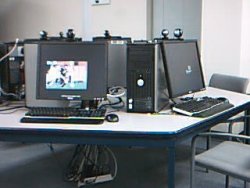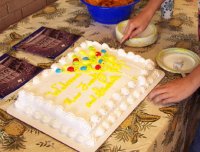The English Department began developing ideas for a writing center in the 1990s. Dr. Elizabeth Cummins and Dr. Larry Vonalt were important forces behind the department’s request for a Center for Writing Technologies. Their project was finally realized in the establishment of the Writing Across the Curriculum Program, which includes the Dr. Beverley Moeller Writing Studio and the Center for Writing Technologies.

A pod of new computers in the Writing Center
Photo taken with the webcam on one of the new computers
While administratively separate from the Department of English and Technical Communication, the Writing Center and the department are close allies, especially concerning the Center for Writing Technologies (usually called "The Writing Center").
This summer, the department arrived at a plan to share licensing fees for new and upgraded hardware and software. I’m sure you are aware of the rate of change of software and hardware. To best serve our students, especially majors in Technical Communication, we need the best equipment and software available. The Writing Center was updated this August.
The updates this summer make the Writing Center UMR’s premier authoring lab. It was designed by a committee of faculty and staff from various departments: Todd Kreuger (Information Technology [IT]), Connie Melone (IT), Jim Turner (IT), John Sequin (Library), Kate Drowne (English and Technical Communication), Richard Hall (Information Science & Technology), and Ed Malone (English and Technical Communication). The new equipment and software were paid for by IT, Center for Technology Enhanced Learning, and English and Technical Communication
In the future, this lab will accommodate such courses as Web-Based Communication and Multimedia Development and Design. In TCH COM classes this semester, students are authoring help systems with RoboHelp and creating books with FrameMaker; next semester, they will be conducting usability tests and creating tutorials with Camtasia.
The lab has extended hours this semester (6-9 M-Th and 12-9 on Sundays) and hired a lab monitor to help patrons.
The new and updated software is available in two other locations on campus. In Computer Science 207, all of the Adobe programs — except RoboHelp — are available 24/7. One of the machines in the library also has all of the Adobe programs — including RoboHelp — so that a student can complete assignments on Friday evenings or
Saturdays. The library also purchased a collection of Adobe classroom-in-a-book tutorials for the specific versions of Adobe programs we have and other tutorials for RoboHelp, Camtasia, and so on.
 In this photo, Erin Cotita, English major and department student assistant, prepares to cut the cake for serving.
In this photo, Erin Cotita, English major and department student assistant, prepares to cut the cake for serving.

 Do you feel overwhelmed when you have to do research and presents the results in a written or oral report?
Do you feel overwhelmed when you have to do research and presents the results in a written or oral report?